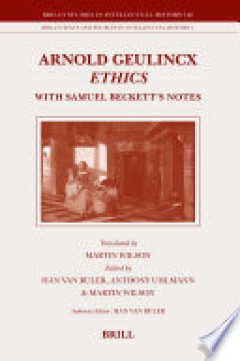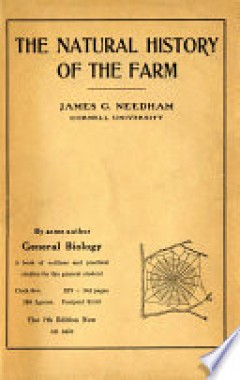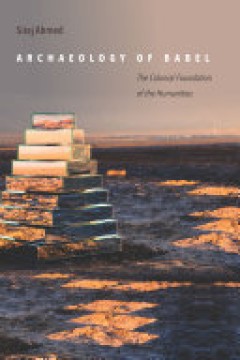Filter by

Arnold Geulincx Ethics
Arnold Geulincx (1624-1669) is a key figure in the history of ideas, whose concepts have been seen as precursors to those developed by Spinoza, Malebranche, Leibniz and Kant. His Ethics presents a treatment of virtue from the standpoint of occasionalist metaphysics. The great Irish writer Samuel Beckett stated that Geulincx, with his emphasis on the powerlessness and ignorance of the human cond…
- Edition
- -
- ISBN/ISSN
- 9789047411383
- Collation
- v, 146 p.: ill
- Series Title
- -
- Call Number
- 200.9 ARN l

A Critical Companion to the 'Mirrors for Princes' Literature
Why devote a Companion to the "mirrors for princes", whose very existence is debated? These texts offer key insights into political thoughts of the past. Their ambiguous, problematic status further enhances their interest. And although recent research has fundamentally challenged established views of these texts, until now there has been no critical introduction to the genre. This volume theref…
- Edition
- -
- ISBN/ISSN
- 9789004523067
- Collation
- vii, 556 p
- Series Title
- -
- Call Number
- 809 PER a

Essays on Paula Rego : smile when you think about hell
In these powerful and stylishly written essays, Maria Manuel Lisboa dissects the work of Paula Rego, the Portuguese-born artist considered one of the greatest artists of modern times. Focusing primarily on Rego’s work since the 1980s, Lisboa explores the complex relationships between violence and nurturing, power and impotence, politics and the family that run through Rego’s art. Taking …
- Edition
- Ed. 1
- ISBN/ISSN
- 978183747580
- Collation
- 510 pages (xvi+494)
- Series Title
- -
- Call Number
- 759 Lis

The Cold War in the classroom : international perspectives on textbooks and m…
This book explores how the socially disputed period of the Cold War is remembered in today’s history classroom. Applying a diverse set of methodological strategies, the authors map the dividing lines in and between memory cultures across the globe, paying special attention to the impact the crisis-driven age of our present has on images of the past. Authors analysing educational media point t…
- Edition
- -
- ISBN/ISSN
- 9783030119997
- Collation
- -
- Series Title
- -
- Call Number
- 909.825072 chi

Publishing Sacrobosco's "De sphaera" in early modern Europe : modes of materi…
This open access volume focuses on the cultural background of the pivotal transformations of scientific knowledge in the early modern period. It investigates the rich edition history of Johannes de Sacrobosco’s Tractatus de sphaera, by far the most widely disseminated textbook on geocentric cosmology, from the unique standpoint of the many printers, publishers, and booksellers who steered…
- Edition
- Ed. 1
- ISBN/ISSN
- 9783030866006
- Collation
- XIV, 492
- Series Title
- -
- Call Number
- 523.1 Pub

Digital Histories: Emergent Approaches within the New Digital History
Historical scholarship is currently undergoing a digital turn. All historians have experienced this change in one way or another, by writing on word processors, applying quantitative methods on digitalized source materials, or using internet resources and digital tools. Digital Histories showcases this emerging wave of digital history research. It presents work by historians who – on their ow…
- Edition
- -
- ISBN/ISSN
- 9789523690219
- Collation
- -
- Series Title
- -
- Call Number
- 025.069 FRI d

Islam and the trajectory of globalization : rational idealism and the structu…
The book examines the growing tension between social movements that embrace egalitarian and inclusivist views of national and global politics, most notably classical liberalism, and those that advance social hierarchy and national exclusivism, such as neoliberalism, neoconservatism, and national populism. In exploring issues relating to tensions and conflicts around globalization, the book iden…
- Edition
- -
- ISBN/ISSN
- 9781003203360
- Collation
- xii + 322 p
- Series Title
- -
- Call Number
- 322.1 LOU i

Natural History of the Farm: A Guide to the Practical Study of the Sources of…
This is a guide to the practical study of the sources in wild nature of our living. It contains a series of study outlines for the entire year, and deals with both the plants and animals of the farm-the things that men have chosen to deal with as a means of livelihood and of personal satisfaction in all ages.
- Edition
- -
- ISBN/ISSN
- 9781501740770
- Collation
- -
- Series Title
- -
- Call Number
- 508 JAM n

Close Reading with Computers: Textual Scholarship, Computational Formalism, a…
Rather than working at the usual scales of distant reading, this book shows what happens when we bring techniques from the digital humanities to bear on a single novel for close readings.
- Edition
- -
- ISBN/ISSN
- 9781503609372
- Collation
- -
- Series Title
- -
- Call Number
- 823.914 MAR c

Archaeology of Babel: The Colonial Foundation of the Humanities
For more than three decades, preeminent scholars in comparative literature and postcolonial studies have called for a return to philology as the indispensable basis of critical method in the humanities. Against such calls, this book argues that the privilege philology has always enjoyed within the modern humanities silently reinforces a colonial hierarchy. In fact, each of philology's foundatio…
- Edition
- -
- ISBN/ISSN
- 9781503604049
- Collation
- 281 p
- Series Title
- -
- Call Number
- 407 SIR a
 Computer Science, Information & General Works
Computer Science, Information & General Works  Philosophy & Psychology
Philosophy & Psychology  Religion
Religion  Social Sciences
Social Sciences  Language
Language  Pure Science
Pure Science  Applied Sciences
Applied Sciences  Art & Recreation
Art & Recreation  Literature
Literature  History & Geography
History & Geography